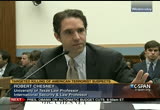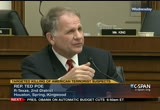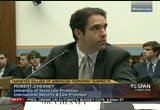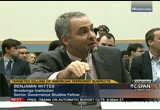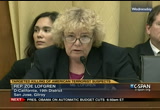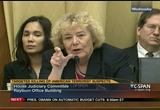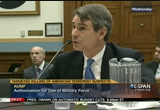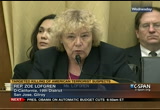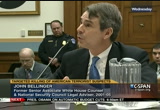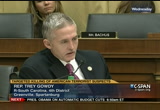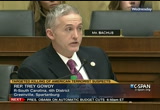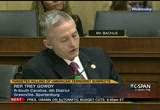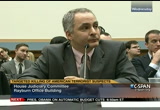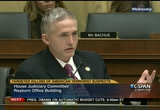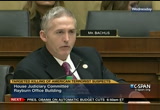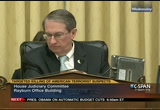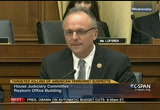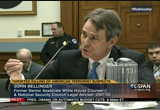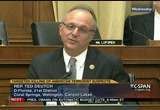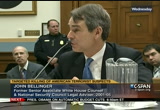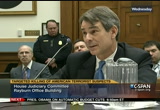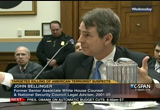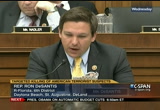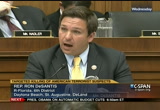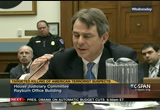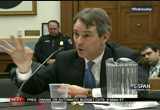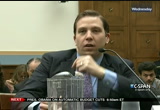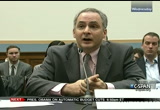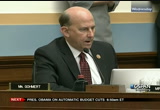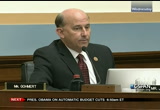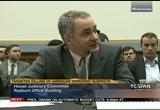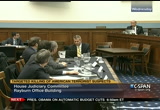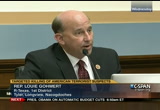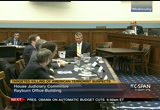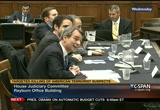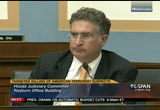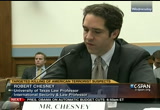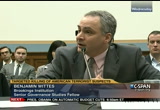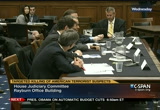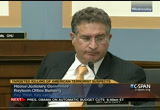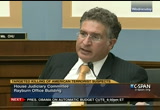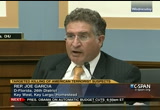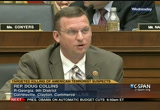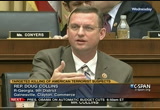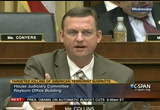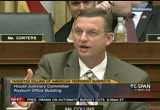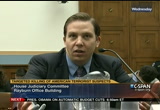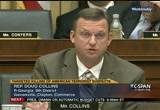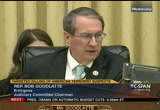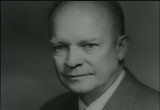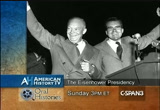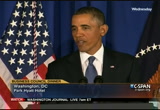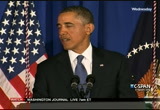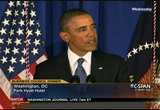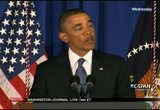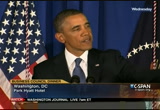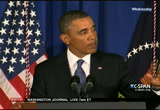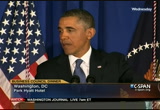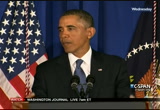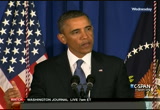tv Capitol Hill Hearings CSPAN February 28, 2013 6:00am-7:00am EST
6:00 am
in questions about should we pull the trigger. that is not the fact presented by these specifically identified kill list scenarios. as we there is a distinction between decided is the person in the attack kabul -- attackable and is there a mission being carried out? >> we have been talking about one individual. what if the individual is caught in one of the countries where we suspect al qaeda is a jumble they are everywhere. what if the individual is in one of our -- what if the individual is caught in one of the countries where we suspect al qaeda is?
6:01 am
day and up in france and we can go after them? -- the end up in france and we can go after them? >> if you have someone in france, united states, mexico, captor is going to be feasible. >> i know my time is feasible. is that discretionary with the executive branch? is that policy or is the written law? >> the problem with the uncertainty is that we do not give clear, written law. >> may i add something to that? >> when you are talking about potential legal force operations in allied countries or countries
6:02 am
other than pakistan, yemen, molly, you are -- mali, you are talking about a situation with the of the constraints come into play. what causes those operations to be permissive is the consent of the government to do those operations, which presumably canada and france are not going to give our a finding that they are either unable or unwilling to manage the threats that the individual poses, which their law enforcement capacity would make it difficult to make. >> 50 gentlemen would yield, i will yield to buy additional 30 seconds to make it -- if the
6:03 am
gentleman would yield, i will yield my additional 30 seconds to make a point. i would be pleased to yield to the gentlewoman from california. >> i have a few quick questions. i am trouble to the theme memoranda that allegedly provided the legal basis for this have not been shared. maybe any of you cannot answer it, but if you can, i would be interested. what conceivable reason would there be for the obama administration to not shared these memos and what are the consequences for not sharing these memos? if anybody can answer that, i would like to hear. >> i would take a stab at
6:04 am
defending the administration on this after having spent four years as a white house lawyer. this was the privately cliff was given to the president of the united states. just as this committee is able to -- this was privately given to the president of the united states. just as this committee is about to rely on the information given to you by mr. raymer. >> this is the committee that has oversight means -- responsibility. >> to the extent they have not made clear what their legal analysis is, absolutely they owe you a full explanation. >> what you can do and what you should do are sometimes different. it strikes me in this case that this is one of those cases. if you take a look that the authorization for use of
6:05 am
military force, which all of us voted for the with as those of us who were here -- which all of us all take for, those of us who are here -- are we to believe that everybody on this list was responsible for the 9/11 attack? is that the rationale? >> all four of us agree with you. the 2001 aumf, which is only 60 words long about -- long, is now very long in the tooth. the extreme government solution
6:06 am
would be for congress to work with the executive branch to revise that aumf. it is completely unclear about who it covers and where it covers it. >> it is as unclear as you suggest. this is a limitation. there were big arguments about it. there was a priory draft that was much more expensive and it was -- there was a prior draft which was much more expansive, and it was narrowed. the president has the right to keep his legal advice confidential. that is a longstanding principle. questions are raised as to whether the executive is complying with the law. if he feels he is, it was be -- would be a positive thing for the administration to share that
6:07 am
legal theory with this committee and with the american people, who i think have dallas that are substantial. if it can be -- who i think have doubts that are substantial. if it can not make clear -- to be cleared up, we have another problem to deal with. >> to the extent that the administration's legal theory remains mysterious to congress, the deal ministration should be appeared to explain and put down in writing what they can -- congress, the administration should be up here to explain and put down in writing what they can. of the americans who are dead, every single one of those fell within the aumf.
6:08 am
the president of the united states is allowed to receive a particular memo on a particular day and rely on that. >> i was not a huge fan of the bush administration, as many of my colleagues know. we actually did get access to their memorandum laying out their rationale. i thought it was poorly written and miss advise, but at least we were -- misadvised, but we've received that and i would expect no less from the current thewe -- but we received that and i would expect no less from the current president. >> i would like to express my frustration at the d.o.j.'s absence today. some of my colleagues know that
6:09 am
i worked there and i have plenty of friends there and i respect their work. not responding to a letter from some guy from south carolina -- i really do not understand responding to judge poe's letter, but i do not understand them not sending anyone. my questions are going to be directed to them. i do not need a d.o.j. memo to tell me you can use lethal force to repel an imminent threat. i did not need them to tell me that. police officers should folks all the time, private citizens shoot folks who are invading the homes of the time. non-citizens can shoot a united states citizen without having to go to a judge beforehand. there is review afterward, both
6:10 am
criminal -- both a criminal and civil. i did not need the department of justice to tell me that. i also did not mean the department of justice to explain to me that in times of war, you deny meeting judge picking your targets for you. at a time of war, -- time of war, you do not need a judge picking your targets for you. there are two references in this memo where the target of a lethal operation, a u.s. citizen who may have rights under the due process clause of the fourth double-fourth amendment -- fourth amendment.
6:11 am
if the fifth amendment attaches and the fourth amendment attached is -- attaches, the as a u.s. citizen who enjoy the full complement of constitutional protections? if not, why not? whichever law professor -- i would pick the one who gave me a bad grade in con law, but he is not here. would the eighth amendment applied? >> the background that this white paper is based on is critical to this question. >> i just want to know if a u.s. citizen enjoys the full panoply of constitutional protections when they are traveling abroad?
6:12 am
does the fourth amendment applied -- apply? >> i will lead to an actual constitutional professor -- >> do i have to comply with miranda it? -- with miranda? i am talking about citizens abroad. >> the short answer is yes. >> so the eighth amendment applies and the six bay and -- xith amendment -- sixth amendment applies. how is the analysis different if it is a u.s. citizen who meets the criteria if it is in south carolina rabin and some or else?
6:13 am
if you have the same constitutional -- south carolina rather than somewhere else? can you take out an american citizen on american soil? if not, why not? the only thing we get to hang our hat on is the feasibility of some senior level d.o.j. official who decides whether it is feasible or not to capture me. that is of little consolation if you are dead. is there criminal review? >> if the government wants to indict one of its officers for violating a criminal statute, certainly. >> who would do it? that would be the executive branch. we have not had much success getting the executive branch to enforce laws against itself.
6:14 am
in the two years i have been here, we are zeroth-3. -- we are 0-3. i am out of time. i would love for the department of justice to come and explain to us with this analysis is equally applicable to american citizens on american soil. the feasibility of capture is of consolation to me if it is the only thing protecting us from this operation. >> the issue was extended and it will stand open. the chair recognizes the gentleman from florida. >> thank you, mr. chairman. you said earlier in your testimony -- you spoke of the
6:15 am
need to of clear and international rules. what would happen if that were taken by other countries? i had to excuse myself to take another meeting. this conversation we are having about constitutional protections in how this drone program against al qaeda functions under our constitution is of the greatest import to this committee. the issue you raise is a good one. what are the international rules. who says to them and what standards would be in place? let me let you elaborate a bit. >> i am delighted that you ask that question. the judiciary is concerned about the protection of americans in
6:16 am
this hearing. 3000-4000 of the people who are dead are not americans. they do not have constitutional rights. the rules that would apply to them would be international. the bush and obama administrations have tried hard to clarify that are conforming to international laws to make sure they are not killing people in assassinations and murders. that said, no other country in the world has come out publicly and said they agree with our position. that is an unsteady place for the united states to be. i wanted the lead to states to appear around the world to be acting in accordance with international law. the obama administration has a certain this and i believe they are. most other countries do not agree with this and are beginning to accuse us of
6:17 am
violations of international law. the lead to stacy's to clarify those rules. >> -- the united states needs to clarify those rules. there are lawsuits in pakistan and leave the u.k. suggesting the sharing of intelligence information with the american government may actually constitute war crimes. that is making british intelligence officials nervous. that is being closely watched throughout europe. >> in order to address these issues going forward, both because of potential actions the other nations may take that would put up with state department spokesmen in a difficult situation to deploy those while standing up to the drone program we utilize -- what
6:18 am
are the standards that would be put in place? tell me what that regime looks like and where does it come from? >> i spent four years as a legal advisor in thousands of conversations with european allies, many of whom are in this room listening to what the bush administration was doing. the obama administration, which never expected to be in the same position of having allies around the world accusing it of illegal activity, these to go to the same effort. he rules would be to say, it is enough to start with a treaty. but to agree on a basic legal principles such as, a country can use lethal force against
6:19 am
terrorists in another country who is threatening an attack if that country is unwilling or unable to prevent that threat. in most cases around the world, 190 countries, those countries are able to present that threat. they can arrest the person. in that our five countries like yemen and pakistan, we want to kick -- in four our five countries like yemen and pakistan, we want to get countries to use lethal -- lethal force to kill someone. we can get the bare, but it makes other countries uncomfortable. they will not agree -- we can get there, but it makes other countries uncomfortable. >> the unlikely position that
6:20 am
would point to this hearing and the debates in this country, you are having a hard enough time coming to terms with this idea at the earliest stages of the potential that drones will offer -- you are having a hard enough time coming to terms under your own constitution and now we are going to have a broader discussion internationally and you are going to suggest to us what we should and should not do. i am not sure we are at the point where that compensation can take place. >> it is difficult. the bush administration had to explain that it was lawful to detain people without trying them people -- without trying them. this is actually much more aggressive. the obama administration is not just detaining them. they are killing them.
6:21 am
we need to work hard to explain to a country committed to the rule of law why and what we are doing is legal. it isn't plotted to have this hearing here. we need to go around the world to explain why -- it is nice to have this hearing here, but we need to go around the world and explain. >> think you all for your testimony. but the scientists agree a little bit with the characterization that this is limited. it is limited in the d.o.j. is saying, we have sufficient grounds. they do not say there will be more restrictions. you agree with the fact that they based their analysis that there is article 51 of authority.
6:22 am
>> the administration would always take the position that it has the authority under article 51 an article to that it can defend the country against an imminent threat. that raises the question of what an imminent threat is. if tomorrow hezbollah prisons and an imminent threat even though it is totally -- present and imminent threat and it is totally outside of the aumf, we can counter that with lethal force. >> with the example of libya, there was no congressional ulceration for us to get engaged in libya. i think the aumf activates the president's war powers. the fact that this congress has authorized that means a lot.
6:23 am
lee logic of this logic only applies to -- the logic of this applies only to senior al qaeda leaders. you have to make analyses that apply to different facts. we can start with mr. bellinger. no aumf for libya. it was an international coalition. if there was an american citizen who travel to algeria and joined the pro-gaddafi army and was a major operational leader in bringing arms into libya that would fight the resistance and american forces and our allies, based on how you read the memo, to you think this provides justification to engage an american citizen in that instance? >> under the memo, probably not. under your facts, the person would not be a senior al qaeda
6:24 am
leader. >> if they limited it to that, why isn't so important? if the aumf is not critical, is there a logical distinction between those two if you to not think the aumf is critical? >> there are a lot of us who wonder how it can possibly be that all of this use of force in countries around the world against people who may have only been 10 years old in 2001 still falls under the aumf. it is a good set of questions as to whether this the administration would rely on the president's constitutional authority to strike someone who did not fall under the aumf. >> in addition to the authority of rising, it is lawful under
6:25 am
the other principles of u.s. and international law, including the president's constitutional responsibility to protect the nation. i agree with that. in a situation like libya where it is an intervention of choice, it did not propose an imminent threat to the lead to states, how does this firmer applied to american citizens? >> suppose we had a resident of fighters stationed at an air force base in libya? if an american citizen goes to algeria to take up arms on behalf of pro-gaddafi forces, is it an attack on u.s. forces station there? >> i agree with that. someone who is across the border in a jury who is doing logistics -- >> we have not talked about
6:26 am
international law. it would be relevant what the what was true in libya was an international conflict that would justify a u.s. military force. there were serious international problems. >> one of the oddities of the white paper, and it is an area for this committee to follow up with the ministration about -- is what the word imminent -- follow up with the administration is what the word eminent is doing. is it to get over domestic constitutional curdles or whether it is an attempt to get around domestic criminal prohibitions as an affirmative defense against the murder of
6:27 am
americans overseas or whether it flows through some of and need. is there as a self composed -- self-imposed constraints. some of the questions you are asking, the answers would be different depending on what the word eminent is doing. i talk about this the little in my written statement. it is an area that is what this committee pushing the administration for some clarification on. >> thank you and thank you, mr. chairman. >> the chair recognizes the gentleman from texas, mr. gohmert for 5 minutes. >> this is an exceedingly important topic and we appreciate you being here today. obviously, the justice departments folks are busy doing something else other than having
6:28 am
oversight. i wish they did not need it. these issues a deeply troubling. my friend, former judge ted poe, is a big believer in due process. m&a that is one of the issues. people brought up the issue of al awlaki been killed in yemen. i think it is good to look at what if scenarios before those scenarios happen. we know al walking had led prayers for muslim congressional staffers -- we know al awlaki had led prayers for a muslim congressional staffers here on capitol hill. can you foresee a time like -- a
6:29 am
time when someone like al awlaki was on a hit list and finishes when he was doing in yemen and gets back into the united states? if there is concern about imminent attack while he was in yemen, could there be those same concerns? when would it be possible for someone on the hit list, as he was, to be hit in the lead to states proper? >> the alabama awlaki case will someday be the subject -- lee alabama awlaki case -- the al awlaki case will someday be the subject of a wonderful book. if he had made it back to the united states, there is no dispute that the proper way to
6:30 am
handle them would have been for the fbi to arrest him and for him to be prosecuted in u.s. federal court. >> my question was not on what was proper. my question was the possibility of someone on the hit list being found in the lead to states. a man was arrested at dallas -- at dulles airport. he had been close to the clintons administration and have worked with the bush administration. he was -- close to the clinton administration and worked with the bush demonstration. he is doing 23 years in prison. what would be the prospect the someone's gets back into the country and, -- someone gets back into the country and, from a political standpoint, they are all rest -- he starts talking
6:31 am
about -- their arrest could be politically embarrassing. what if you have someone working closely with the president. we had a member of a known terrorist organization meeting in the white house last year it even though secretary napolitano could not answer that she even knew that was happening when it was in the papers. by the time she gets into the city and she says he was vetted 3 tons. there are things that could be proven so politically embarrassing that if somebody gets back into the lead to states, someone might look for a way to see that they never testify. we are talking hypothetically. i would like to know what of the possibilities of something like that happening. >> nothing in the administration's white paper suggests that would be lawful.
6:32 am
i would hope that in the administration, republican or democrat, faced with such a situation, would behave like patriots and would proceed according to the law and the constitution. i would hope this committee in the event that did not happen with consider it under its impeachment power. >> when no one from the justice department kids to participate, then what? we find them in -- when no one from the justice department will participate, then what? we find them in contempt? whatever but under political pressure acts like patriots. -- not everybody on the political pressure tax like patriots. -- acts like patriots.
6:33 am
what if your contention is that there is an imminent attack? it is plan that he helped set institution up in yemen and we need to take him out? >> the gentlemen's time has expired. >> thank you, mr. chairman. what steps could be extended and plans to take to allow corporate congressional oversight and informed public debate? i leave that to all of you. >> -- -- the administration needs to be more open in their legal analysis. we are happy to be set in spain to help you out. i believe it is incumbent on
6:34 am
this demonstration to explain and answer your questions. it. -- i think the executive branch could work with congress to craft a narrowly tailored law that would specify the circumstances under which an american can be targeted and the notice process to congress. the main thing the executive branch could do would be to work with congress on legislation that does not tie the hands of the president. i will go back on the judicial review point. we are talking about an armed conflict. the gentleman from texas is no longer here. we are talking about a situation where the president is dealing within the armed conflict. it is inappropriate to insert you to show -- in search
6:35 am
judicial review to tie the insert judicial review to cut the president's hands. >> active participation in oversight efforts by this committee and others is critical. i echo what have already been set on that point. there are substantive and procedural issues driving all of this. it would be useful for congress to express that it was willing to do so as to what the substantive brown started to an american would be. if there is an issue -- as to what the substantive grounds to target an american would be. i am the one who is most in
6:36 am
favor of a permissible. we have an array of use here. -- views here. >> one thing the administration could do is to cut more and more about what the use with look-alike. starting with the president's speech -- what the use would look like. the administration talked a lot about the underlying legal regime, not at the level of granule rarity -- granularity that most people would want. i encourage them to be more granular on that point. it is a procedural whole --
6:37 am
hole. not the substantive content of who you can carpet. they have been pretty clear about that -- not the substance of higher -- substantive content of who you can target. they have said little except to say there are rigorous internal tax. i would like to see them talk more about what those internal systems look like. almost everything we know is the result of press coverage has and leaks. it is time for them to have something substantial to say on this subject. >> i do not have much to add to my colleagues. the lack of any sort of detailed explanation on the procedural process. if there are reasons why the
6:38 am
intelligence led us to discover those facts should be kept classified, that is one thing. why is the bureaucratic process undertaken? eyes and i think it is a matter of national security. -- i do not think it is a matter of national security. >> i fully understand your point and i appreciate it. i think it is necessary. the idea that that process would be analyzed in a vacuum without the exigency of circumstances is something that would be a debate. i understand your wanting it. under the present climate, it is almost impossible. >> the is a lot of merit to that point. there is an additional factor about the litigation environment
6:39 am
the administration is in. within the bureaucracy, people are constantly worried about the incremental affects of foia litigation. everytime you consider same x, you know you will get a brief filed the next day the says, you have confirmed x. we want 2x. there is some kind of safe harbor we could create that does not discourage the administration to make disclosures to this body. >> i have listened to johnson case where he got into this crazy habit of sitting with his cabinet deciding with the bombs were going to land. it is an insane process and you
6:40 am
are engaged in war. i do not have to make that point to all of you. you have watched the same process that we partakes of here where we are q. how many angels fit on a pinhead. maybe you -- where we argue how many angels fit on a p8nhead. -- pinhead. look at all of the due process these guys get. these are enemies of our country. we hope that when someone is elected from our side or the other side, that they used the discretion of their office is pretty broad in wartime with all of the merits we expect of
6:41 am
someone who serves in that role. thank you for fighting for these issues. it is important. >> mr. chairman, i yield back the balance of my time. thank you. >> thank you. the chair recognizes the gentleman from georgia, mr. collins. a lot >> -- >> we do argue about things like the number of angels on the top of a pinhead. justice decided not to show up. instead of engaging in the conference, they chose not to come. it is interesting about your comments about being in the bush administration. my grandmother used to say, do
6:42 am
not criticize anybody too hard because you might be in their position one day. i believe the administration does not want a definition of eminent threat because that have to define what is imminent and when is it going to be applied and in what areas will it be applied? i would agree the if they were in the united states, they would fall back on feasibility. i am not sure that is true. not in our society today. i have distinct concerns. how long can this administration or the following administration keep this argument why? how long is this going to last, especially when
6:43 am
we have shut down the war in iraq. as someone who has served in iraq -- how long can they depend on this? >> my colleague wrote an op-ed in the washington post. more recently, we published a paper on you and the growing threat is the beyond aumf and the problem is more imperative. >> they can do the process of judicial review if they want a standard review. i have a question about that. the issue that comes to my mind is, we did not have this review right now. there is a veil of secrecy. there is no one to nine the
6:44 am
article to privilege. there is no one to nine there are -- there is no one to nine the article -- denying the article 2 privilege. it is likely going to my 14- year-old st., what is your decision making process and he says, -- my 14-year old saying, what is your decision making process. damages never make you whole completely. we would not indict one of our own. but cully made his colleagues to put--- -- my colleague made his
6:45 am
comments. who would be at fault? we will throw the lowest person under the bus. where would you stop in culpability? which is stocked with the president's? >> it would depend -- would it stop with the president? >> it would depend on who was the one who made the decision that had the legal error in it. even though this guy was only as his guest house, that is enough to decide he is senior leader of al qaeda. congress could write a statute when the damages peace will not depend on who is at fault. -- piece of it would not depend on who is at fault. we would not point that one guy
6:46 am
who is just doing his job. >> we know how that is going to play out in administration politics. one to state it again. the administration today had a chance to do what this president has said overall, he wants to have an open administration that reflects the priority of his administration and his people. this did not happen. they took a forfeit the day. about -- there are ways to do this. higgling a city commuting and saying, we have all the things we want to do -- simply ignoring a safety committee and saying, we have other things we want to do -- a sitting committe
6:47 am
and saying, we have other things we want to do, that is the concern i have. this is why this committee needs to have oversight and needs to have the administration actually show up to the game. with that, i yield back. >> i thank the gentleman for his pertinent comments send a thank all of the members of this panel. i, along with the gentleman from georgia, the gentleman from new york, are troubled by the fact that we have not had cooperation from the administration in terms of producing important documents we need to conduct our oversight properly, or a witness on behalf of the administration to testify. we will continue to work together to conduct the
6:48 am
oversight necessary and to take the next steps that may be necessary. in the meantime, we probably will have additional questions for each and every one of you. in a moment, i will ask for unanimous consent to allow members to answer -- ask questions. this concludes today's hearings. all members will have 5 legislative days to submit additional questions or materials for the record. the hearing is adjourned. [captioning performed by national captioning institute] [captions copyright national cable satellite corp. 2013] quacks' eisenhower handle crises so well -- >> eisenhower handle crises so
6:49 am
well. people think of him as this pleasant man with the winning smile. behind that smile were some icy blue eyes. when eisenhower looked healthy crisis, he looked the big coal lead and made decisions said he did not have the liability and other decisions had that remain emotionally. he was an emotional man, the he did not allow his emotions to control him when big decisions had to be made. >> richard nixon and flex on his time as vice president to white eisenhower -- reflects on his time as vice president to the white eisenhower. dwight eisenhower.
6:50 am
remarksdent obama's are from the business council dinner. ♪ >> thank you very much. please. i didn't think they were going to do the music. [laughter] >> andrew, thanks for your introduction and leadership. i want to say hello to everybody, many of you i have known for a very long time and some of you i have met more recently, but let me say at the top what i always like to
6:51 am
emphasize when i get a chance to speak to our business leaders and that is i'm very much rooting for your success, because what is absolutely true is that when your companies are thriving, when your bottom line is where it needs to be, then the possibilities of jobs and growth and people realizing their dreams are greatly enhanced. the good news is after four years of difficult times, we have seen a steady recovery, if not as robust as we would like. and you know, we have seen over six million jobs created over the last 35 months. housing is finally beginning to recover. there is reason for optimism as we move forward. i think what everybody is aware of here, though, we have a long way to go. unemployment is still too high. middle-class families are still feeling enormous stresses and
6:52 am
strains and what i think everybody is concerned about is the enormous uncertainty in terms of the political framework, the tax framework, the debt framework within which all of you are going to be operating over the next several years. >> right now the biggest manifestation is the sequester kicking in at the end of this week. i should point out and i'm sure you have heard from a number of experts and economists that this is not a cliff but it is a tumble downward. it's conceivable that in the first week, first two weeks, first three weeks, first month that unless your business is directly related to the defense department, unless you live in a town that is directly impacted by a military installation, unless you are a family that now is trying to figure out where to keep your kids during the day, because you just lost a head start slot, a
6:53 am
lot of people may not notice the full impact of the sequester. but this is going to be a big hit on the economy. and both private sector as well as public sector economists are estimating we could lose as much as six-tenths of a point or more of economic growth. and that means inevitably, hundreds of thousands of people who are not going to get jobs that otherwise would get them. it means that you have fewer customers with money in their pockets ready to buy your business -- your goods and services. it means that the global economy will be weaker because although we obviously still have a long way to go in recovery, we are actually doing significantly better than some of the other developed nations. and the worst part of it is, it's entirely unnecessary. it's not what we should be
6:54 am
doing. i have said this before. i will say it again. and i suspect i will be repeating it during the question and answer session, but if you look right now at what our economy needs, taking $85 billion out of it over the next six months indiscriminately, arbitrarily, without a strategy behind it that's not a smart thing to do to make sure that america grows and our middle class is thriving and there are ladders of opportunity this the middle class. what we should be doing and i have been calling for repeatedly over the last several months and years, is a balanced approach to deficit reduction that combines some tough spending cuts, particularly focused on how do we deal with long-term trends on some of our entitlement programs and a tax
6:55 am
reform agenda that without raising tax rates further, could, in fact, raise sufficient receive news that combined would yield $1.5 trillion in deficit reduction over the next decade and would replace the sequester and would bring our deficit to g.d.p. ratios below the 3% threshold we need for stabilization, that would stabilize our debt to g.d.p. ratios for the next decade and would lay the grouped work for more expansive growth because we would have simplified our tax system, closed some tax loopholes and broadened our base, seeing an opportunity for corporate tax reform that could also make the whole system more sensible and give you guys a more competitive posture internationally.
6:56 am
that's what we should be doing. now you will be happy to know that that's what i offered to my republican friends back in december after my election, before the fiscal cliff. many of you were involved invoicing support for such a balanced approach, even if you deposit sign on to every detail and every line item in our recommended budget. and what i have said is that cons to be the offer on the table. i continue to make tough decisions, some of which will garner some significant frustration on the part of members of my party, but i think it's the right thing to do. what i can't do is to abide by a set of decisions here in washington that would put the entire burden of deficit reduction on our seniors, making their health care more expensive, students that would make their student loans and going to college more expensive, that would gut our investments in education and research and infrastructure, all the foundations for long-term
6:57 am
growth. that's not what we are going to do, because it wouldn't be good for the country and frankly wouldn't be good for your businesses. now the question then becomes how do we get from here to there. and i was telling andrew before we came up, the issue is not technical. the issue is political. and the question is whether or not we are going to see a willingness on the part of all parties to compromise in a meaningful way. and what that means is democrats have to accept the need for entitlement reform. but it also means that republicans have to accept the need for additional revenues if we are going to be able to actually close this deficit and provide the kind of certainty that you need to make your long-term investments.
6:58 am
whether that can be done in the next two days, i haven't seen things done in two days here in washington in quite some time. on the other hand, the good news is i think the public is beginning to pay attention to this. and one thing i'm certain about is the country as a whole is wary of washington presiding over a manufactured crisis every three months. it's not good for business confidence and certainly not good for consumer confidence. it's unnecessary. and my strong hope and the case i'm taking to the american people is that we can once and for all resolve this in a way that is equitable, in a way that is focused on growth and in a way that provides opportunity for everybody in this country who is willing to work hard regardless of what they look
6:59 am
like or where they come from or region of the country they live in. and it's right there. it's there for the taking. and what i strongly believe is if the business community speaks out for such a sensible, balanced responsible approach, then eventually it will get done. i think it was winston churchill who once said americans always do the right thing after they have exhausted every other possibility. and we are getting to the point where we have now exhausted every other possibility. and i have confidence that what's been true for our country in the past will be true for this country in the future. with that, let me open it up and take some questions. >> "washington journal" is next, live with her phone calls. beginning in about 45 minutes, beginning in about 45 minutes, we will discuss
94 Views
IN COLLECTIONS
CSPAN Television Archive
Television Archive  Television Archive News Search Service
Television Archive News Search Service 
Uploaded by TV Archive on

 Live Music Archive
Live Music Archive Librivox Free Audio
Librivox Free Audio Metropolitan Museum
Metropolitan Museum Cleveland Museum of Art
Cleveland Museum of Art Internet Arcade
Internet Arcade Console Living Room
Console Living Room Books to Borrow
Books to Borrow Open Library
Open Library TV News
TV News Understanding 9/11
Understanding 9/11